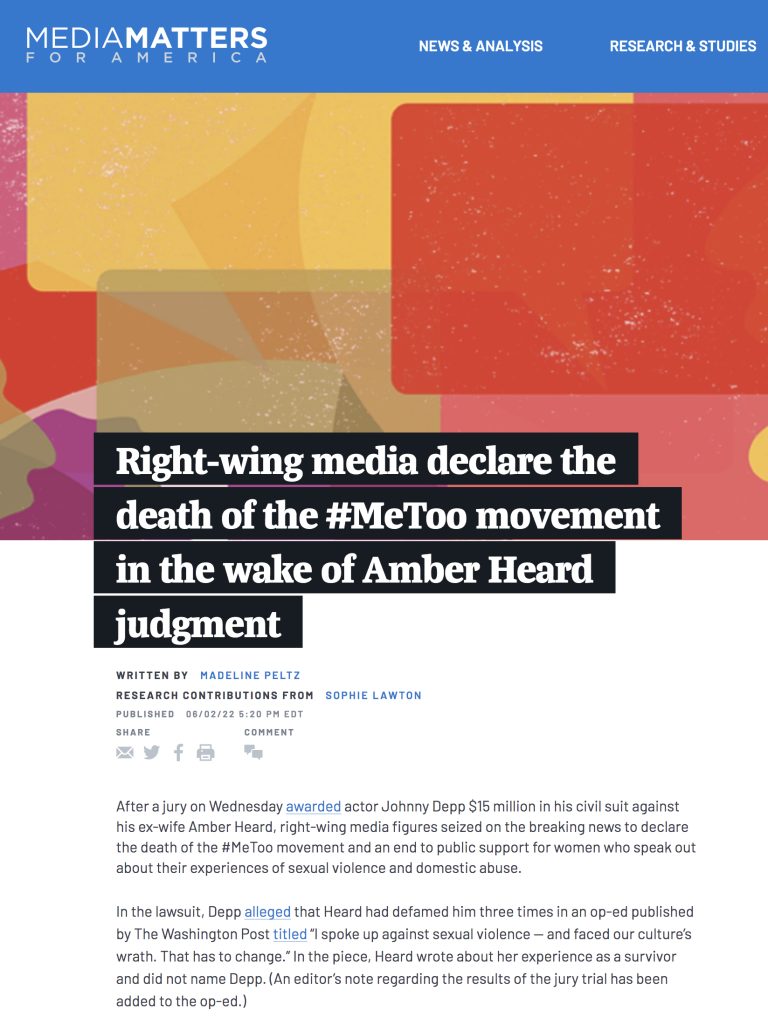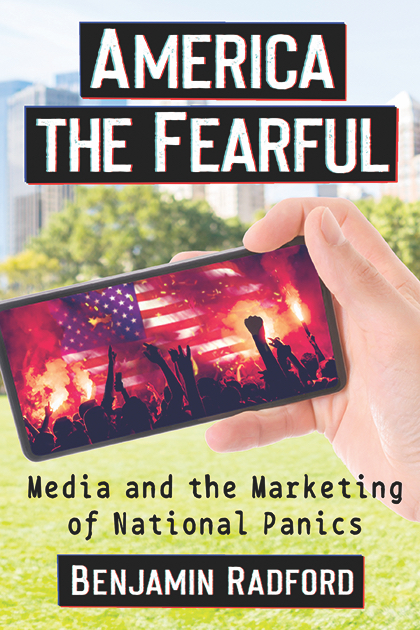In the wake of the July verdict in the dueling defamation lawsuits between actors Amber Heard and Johnny Depp, there was of course much punditry, commentary, and crystal gazing. It was seen not merely as an outcome of one trial between two often-toxic celebrities but a harbinger of social trends to come.
New York Times staff editor Spencer Bokat-Lindell wrote a piece titled “Is the #MeToo Movement Dying?” in which he noted that the trial “has been read as a low-water mark for the movement: After and even before the jury found last week that each had defamed the other, awarding $2 million in damages to Heard and $10 million to Depp, commentators were declaring ‘the death’ and ‘the end’ of #MeToo.” Rolling Stone magazine added: “’This is basically the end of MeToo,’ Dr. Jessica Taylor, a psychologist, forensic psychology Ph.D., and author of two books on misogyny and abuse, tells Rolling Stone. ‘It’s the death of the whole movement.’”

Conservative news media also joined in the chorus; as Media Matters noted, “After the verdict was announced, Fox News gleefully celebrated the supposed end of the #MeToo movement. In the minutes after the news broke, anchor Martha MacCallum declared, ‘This puts a bit of a stake in the heart of the notion that you believe all women.’ On The Five, co-host Greg Gutfeld sniped that Heard had ‘used the #MeToo movement and now she’s betrayed the #MeToo movement. You can’t believe all women, is basically what this case is saying.’”
However, it seems that pundits on both sides of the issue got it wrong—as they often do.
The verdict was about the claims and evidence in that case specifically, and there’s little evidence suggesting that it would (or will) be a death knell for the movement. I described this phenomenon as the Ubiquitous Referenda in my new book, America the Fearful: Media and the Marketing of National Panics:
It seems that these days most news national and world events are treated as important bellwethers or referenda about the state of our country and the state of the world. This is partly why activists on all sides feel the need to characterize events as a clear step toward social destruction. For example in early 2016 predictions were made that if Trump was elected his sexism and misogyny would influence a generation of young American men and lead to increases of sexual harassment and assault.
Every politically or socially charged news event is framed as a decisive moment where the misguided must be corrected, others must be shown the error of their ways. We jump from week to week, hearing about mistreated airline passengers or people saying mean things about celebrities. The barbarians are at the gates again today, everything is outrageous, everything is crucial, and all dutiful Americans should once again gather along the virtual parapets to loudly remind ourselves (and those misguided souls on the other side) that we publicly denounce them.
There are several problems with this approach. First, it seems to assume, without evidence, that American culture itself is fragile and hinges on some event, that if these incidents are not strongly and widely denounced then American society will self-evidently come to see these things (sexism, racism, sexual assault) as socially sanctioned and acceptable or “normal.” A popular headline for op-eds is, indeed, “This Is Not Normal,” as well-intentioned critics remind readers about some abnormal aspect of their lives against which they should remain vigilant. The fact is that people are not nearly as easily influenced as widely believed (and especially as advertisers would have us believe, as described later); we should know how hard it is to convince people of anything—even when we have facts and science on our side.
The idea that America is on a powderkeg, on a razor’s edge and about to explode into riots and wars based on gender, politics, or race. Ironically, it’s often fringe right-wingers—those who obsess over and interpret each real or perceived racial injustice through some blinkered prism—who are most likely to believe that America is a small step from cultural revolution.
When a Ku Klux Klan rally was scheduled for downtown Dayton, Ohio, in May 2019, Rabbi Ari Ballaban, director of Dayton’s Jewish Community Relations Council, was quoted in local news media warning of unrest and violence, stating that “Courthouse Square will be a powder keg.” Those expecting blood in the streets and race riots need not have feared; a grand total of nine people showed up for the racist rally. They were dwarfed by the estimated 500 to 600 counter-protesters of all races and colors, many shouting slogans and holding signs such as “You Are Not Welcome Here,” “Refugees Welcome, Racists Go Home,” and “Injustice Anywhere Is a Threat to Justice Everywhere.” Local businesses displayed signs such as “Get your hatin’ out of Dayton” and “fucKKK off.” There are many other examples, but for a country as deeply racist as America is said to be, the vast majority of Americans seem to be doing their best to denounce racism and intolerance at every turn. The rabbi, like many others, had overestimated the support that the Klan had locally.
It’s very difficult to get individual people to change their behaviors, even when they are given explicit information on what to do and how to do it. There’s no mystery about how to lose weight or quit smoking, but few people do. People, like ships, have difficulty changing direction; inertia and routine (physical as well as mental) keep us doing the same things, even when we know we shouldn’t. Countries, that is, collectives of hundreds of millions of people, change even more slowly. Institutional reforms take years or decades, not weeks or months—a point often missed by those who demand immediate social and justice reforms.
For some reason people who are comfortably stuck in their own ways and worldviews assume that other people—They of the third-person effect—are on the precipice of changing their minds (for the worse, of course) should they be exposed to “wrong” ideas. They are in danger of adopting sexist behavior because of Game of Thrones or the optional female voices available for Siri and Alexa, or going down the rabbit hole of violence because of violent video games or movies.
There’s also outrage fatigue to consider; when everything is a crisis, nothing is a crisis. When people spend their days looking for (real or imagined) things to be outraged about, it muddies the waters and makes it hard to distinguish real problems from manufactured ones, serious issues with a high potential for real harm from others with a much lower potential for some inchoate, potential harm. Just as atmospheric smog takes a toll on the health of both people and societies, fear smog takes a collective toll on psychological and social health.
Part of this is the fear that the unwashed masses, the semi-fictional “They” who aren’t as enlightened as you and I, will be easily swayed and misunderstand the situation: If we don’t make it clear that Trump’s sexism is unacceptable, They (high school kids? young men?) will think it’s okay and America will have a generation of rapists and misogynists. If we don’t make it clear that racist marchers are unacceptable, They (non-racists or those on the fence about whether to be racist?) will think it’s okay and America will sow a generation of Nazis.
The good news is there’s little or no good evidence for this assumption. Most of these are testable claims: either sexual assaults go up in the months and years following Trump’s election, or they don’t (they didn’t). Critics might argue an essentially unfalsifiable claim, that their protests prevented or minimized the harm (i.e., if Trump hadn’t been universally condemned for his remarks about grabbing women, he would have had more influence, or if the Virginia and Ohio racists hadn’t been drowned out by counter-protestors and a deluge of mockery and bad press, they would have gotten more recruits). It’s possible, though doubtful—and of course we will never know, precisely because all these things have been widely condemned by most Americans.
This rationalization is reminiscent of doomsday cults, who, when confronted with the fact that the world did not end as they had predicted, claim that their dire prophecy, along with the resulting awareness campaigns and vigilant prayers, had saved the day. The doomsday cultists then pat themselves on the backs, because, after all, they just saved the world—and no one can prove otherwise. As Trump’s presidency ended we have not seen a jump in Americans who think sexually assaulting women is acceptable. Nor was there a surge in membership to white nationalist organizations after people saw the Charlottesville rally and said, “Wow, those guys are right and make sense!” Instead, virtually all the news coverage about it has been negative—as it always is.
Are there exceptions? Of course. Out of hundreds of millions of Americans, a few will see some Klan rally, ignore the overwhelming social criticism of it, and join up. Similarly it’s possible (though unlikely) that a few women may in fact be deterred from reporting their assaults because it took so long for Bill Cosby to be convicted, and that some trolling dudebro will cite Trump when he’s arrested for grabbing his date’s crotch. These are the rare exceptions, not the rule, and the amount of energy directed to these specific events (as opposed to the larger issues—sexism, racism, etc., which are valid and real but hardly represented by these events) is wildly disproportionate to the threat.
Protesting can bring about change, and that’s valuable. But over-protesting undermines its effectiveness, and saturating our airwaves (or social media feeds) with the worst elements of society as if they are representative of America insults those who have worked so hard to bring about the progress we should celebrate and emulate. There’s also an element of virtue signaling and pageantry in today’s clever protest march signs and hashtag activism, of course. The point is not that people shouldn’t protest things they find offensive or wrong (do whatever you want), but instead that there are dangers and pitfalls in how people are approaching it. There are real, legitimate watershed moments in American history (Roe v. Wade and its overturning, Obama’s election, George Floyd’s death, etc.) but we lose our ability to spot these moments if we are feeding ourselves a daily diet of outrage.
Whether the Heard/Depp verdict truly is the nail in the #MeToo coffin—as both progressives and conservatives have claimed—remains to be seen, but it seems unlikely. For years, polls and survey have found that the American public overwhelmingly does believe women when they come forward with claims of abuse. Whether Americans supported Heard, Depp, or were indifferent, the verdict is likely to have little effect on real victims coming forward.
For more on this, see my book America the Fearful, and check out my recent lecture for Skeptical Inquirer Presents.

0 Comments